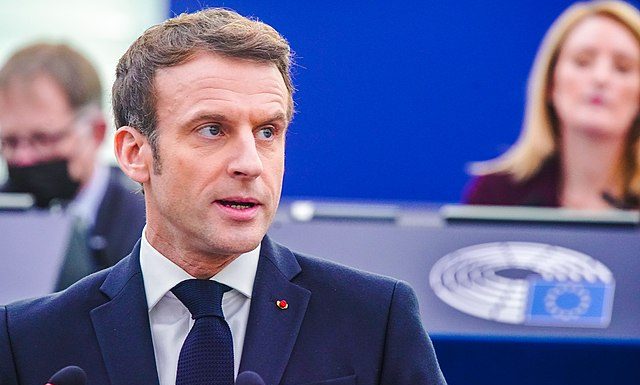By Greek commentator Antonis Giannakopoulos, an economics student at Athens University
Russia’s invasion of Ukraine is nearing it’s first month. Fortunately, U.S. President Biden and NATO have refused to enforce a no-fly zone which could mark the start of an all-out nuclear war with Russia. Instead, just like in the past, the West has opted for economic warfare, but this time around, this is happening in an unprecedented and swift manner, causing a huge shock not only in the Russian but also in the global markets.
Russian banks have been cut off from the international banking communications system (SWIFT), the U.S. have imposed an embargo on Russian oil imports, oil companies are halting their operations on Russian soil and multinational corporations are withdrawing from Russia.
This has caused the Ruble to lose a lot of value. It has also caused Russian inflation to skyrocket, as there is now a serious risk of Russia defaulting on its debt.
EU slaps fourth round of sanctions on Russia, but Europeans still can buy Russian oil, gas and nuclear fuel. With @FabianZuleeg @epc_eu #Ukraine #sanctions https://t.co/PHleDQ1zeD
— EUobserver (@euobs) March 15, 2022
Blowback
Unfortunately for the West, the sanctions are however already backfiring. Russia is not only a major energy supplier, especially for the European Union, but it is also an exporter of strategically important resources: wheat, metals, fertilizers etc.
Economist does not hide scale of pain that could ensue from the war and the near exclusion of one of the world’s biggest commodity exporters from the global economy. @njtmulder @NewLeftEViews @IsabellaMWeber https://t.co/xnfPbSNFlG
— Ted Fertik (@tedfertik) March 14, 2022
SANCTIONS’ ECONOMIC FALLOUT: Sanctions on RUS are rippling through supply chains, creating bottlenecks in the transport of goods. This will create economic pain for countries & businesses globally. First a COVID pandemic. Now a sanctions fallout pandemic. https://t.co/qpSExehSU0
— Steve Hanke (@steve_hanke) March 15, 2022
Moreover, history has shown that sanctions are rarely successful in terms of meeting their objectives, which in this case is getting the Russian army out of Ukraine and perhaps delivering future regime change in Russia.
In the past, the U.S. imposed heavy handed sanctions on countries like Cuba, Iran, Venezuela North Korea for many years, but the results were unfortunately the same every single time: impoverishment of ordinary people that are victims of the ruling regime, while those in charge seem to do fine.
The Cuban regime, for example, is still in place, now for decades already, despite being responsible for economic chaos and corruption. The same applies to all the other authoritarian regimes mentioned.

For sanctions to work, there would be the need for global cooperation. While most countries in the west have taken a tough stance towards the invasion of Ukraine, other major powers have not done so, deciding instead to stay neutral or not to impose any sanctions.
Over the long term, Russia will be able count on emerging markets as buyers of its resources. Since 2014 already, Russia has been busy finding financial alternatives to make Russia less dependent from the U.S. and the dollar. Transactions structured around currency swaps do not require access to the U.S. financial system, so the complete economic isolation of Russia is an unlikely scenario.
Even if Putin was already unpopular before his aggression against Ukraine, Russian citizens still face a collective action problem to bring him down. According to academic literature, sanctions can create a “rally around the flag effect”, as they enable the Kremlin to blame outsiders for its own economic mismanagement and the hardships faced by the Russian people.
"Sanctions are the foreign policy key that fits the lock of every crisis, but they do not open doors to anywhere new." – @njtmulder responds to the four reviews in our special book forum on his new book "The Economic Weapon"https://t.co/t0njhfUZoQ
— Tocqueville 21 (@Tocqueville21) March 14, 2022
So far, the people that have been affected the most by measures like cutting off Russian banks from SWIFT have been those Russians that are making money from abroad or Russians with Russian bank accounts that have fled to neighbouring countries. These are also typically the ones that are the most liberal and vocal against Putin’s regime, organizing anti-war demonstrations across the country, at risk of being arrested.
These new sanctions have effectively killed the sources of income of these people, leading them to poverty and ending their chances of putting up effective opposition. Punishing the innocent in this way is not only immoral, but it effectively makes them a victim twice.
Sanctions only make sense from the perspective of domestic politics and political psychology, due to the pressure to “do something” about human rights violations and military aggression. They provide for a middle-of-the-road solution between military force and doing nothing, making it unlikely to cause a domestic backlash, because the damage inflicted is unseen.
Possible alternatives to sanctions
There are however things that the West can do to apply pressure on Moscow, targeting the Russian government and not the Russian people.
A first option is what was recently proposed by economist Scott Sumner () and involves getting Iran back into SWIFT, whereby Iran would be allowed to boost its oil exports, thereby harming the Kremlin with lower oil prices.
This would not only benefit European consumers, but it would make European countries also less reliant on Russian energy. This option actually enhances European energy security, unlike sanctions.
Secondly, EU member states, Canada and the U.S. could offer green cards or Visas to Russians with technical degrees. Russia is already facing a brain drain problem and with this simple move, the West could hit the Russian war machine.
It would also encourage the liberal elements of Russian society, who would benefit from greater economic opportunities, international exposure, etc. If Putin would respond to this by blocking emigration, it would greatly reduce his popularity and put him in a similar situation like the ones faced by the Warsaw pact regimes during the cold war.
"Sanctions are no longer scalpel-like instruments that exploit globalisation. At their current scale, they're a tempest that will change globalisation itself in major ways."
A short essay for @TheEconomist placing sanctions on Russia in historical context https://t.co/X8eHK0J3Jd
— Nicholas Mulder (@njtmulder) March 4, 2022
Conclusion
Sanctions should be used to as a tool supporting an overarching strategy. When they are linked to unrealistic goals, an unwinnable situation emerges. Sanctions should provide for incentives, by including clear measures to be taken that are politically viable to the targeted nation. Sanctions should be immediately lifted once those measures are taken.
While a useful tool, santions often come with significant costs, as innocent citizens and businesses in the West and in Russia face much of the economic burden, while non-Western governments will seek ways to circumvent them.
Instead of thinking of new ways to punish the average Russian, we should look for ways to help Ukraine and the Ukrainians. Another cold war with a nuclear power should not be our end-goal. Instead, we should pursue diplomacy and compromise in order to avoid it.
Economic warfare is a form of protectionism and against the principles of liberalism. It is not a long-term solution. The definition of insanity is doing the same thing and expecting a different result. This time around, we need to put achieving results above domestic politics.
***
Sources and further reading:
https://www.cato.org/sites/cato.org/files/articles/ashford-foreign-affairs-v95n1.pdf
https://www.cato.org/sites/cato.org/files/2019-12/Sanctions_2019_EG_0.pdf
https://www.econlib.org/lessons-of-the-economic-sanctions-against-russia/
https://mises.org/wire/steep-cost-sanctions-europe-and-russia
https://www.cato.org/commentary/punish-russian-government-not-russian-people
https://www.econstor.eu/bitstream/10419/83668/1/769324819.pdf
Disclaimer: www.BrusselsReport.eu will under no circumstance be held legally responsible or liable for the content of any article appearing on the website, as only the author of an article is legally responsible for that, also in accordance with the terms of use.













